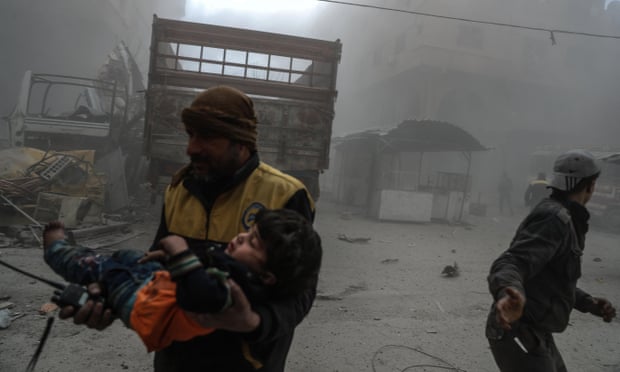Syrian regime forces launched a fresh ground and air offensive on Sunday against rebel positions in the besieged and battered enclave of eastern Ghouta in defiance of a nationwide ceasefire ordered by the UN security council.
Witnesses said fighting erupted on several fronts in what was seen as a possible last-ditch bid by Bashar al-Assad, Syria’s president, to eliminate opposition resistance in Ghouta, near Damascus, before the 30-day ceasefire can be enforced.
At least 14 civilians including three children were killed in strikes on Sunday, said the Syrian Observatory for Human Rights monitor, bringing the total number of dead in the week to 530, among them over 130 children. The monitor said the bombing was less intense than attacks over the past week.
Q&AWhy is the regime targeting eastern Ghouta?
Show

Eastern Ghouta is the last rebel-held enclave bordering the Syrian capital, Damascus. Since 2013, forces loyal to President Bashar al-Assad have imposed a suffocating and deadly siege on the area. Yet several insurgent factions have retained control.
This month, Syria’s army launched one of the most intense bombardments of the war, saying their assault was necessary to end rebel mortar strikes on the capital. Residents accuse Russia of also bombing Ghouta, a mixture of dense suburbs and fields that once served as the breadbasket for Damascus.
The latest violence nevertheless presented a direct challenge to the authority of the security council, which voted unanimously for a ceasefire on Saturday after days of intense and often acrimonious debate. The fighting also increased pressure on Vladimir Putin, Russia’s president and Assad’s most powerful backer, to rein in his Syrian ally.
Putin has faced sharp western criticism over what were viewed as cynical Russian attempts to delay passage of the ceasefire resolution. The US, Britain and other countries accused Moscow of deliberate time-wasting in order to allow Assad the opportunity to complete the reconquest of eastern Ghouta – a charge refuted by Russia.
In a joint telephone call to the Kremlin on Sunday, Angela Merkel, Germany’s chancellor, and Emmanuel Macron, France’s president, urged Putin to ensure the ceasefire was fully implemented as soon as possible. No details of the conversation were made public.
Human rights groups said it was vital to keep up the pressure. “If security council members want to save lives in eastern Ghouta, they must enforce [the] resolution,” said Ibrahim al-Assil of the Syrian Nonviolence Movement. “This means articulating clear, meaningful consequences for any party that violates the 30-day truce, and introducing a credible timetable to turn the temporary truce into long-term de-escalation.”
The UN’s painstakingly negotiated ceasefire resolution is limited in scope and intended primarily to allow delivery of humanitarian aid and medical assistance, and the evacuation of the wounded. It called for the ceasefire to begin “without delay” but did not set a specific timeframe, following Russian objections. Nor did it say how a ceasefire would be enforced, how the injured would be evacuated, or how returning aid workers would be protected.
Bashar Ja’afari, Syria’s ambassador to the UN, said the fight against “terrorism” would continue regardless, noting the ceasefire excluded named organisations such as Islamic State and an al-Qaida affiliate, Hayat Tahrir al-Sham (HTS), formerly the al-Nusra Front. “Our government will reserve the right to respond as it deems appropriate in case those terrorist armed groups are targeting civilians in any part of Syria with even one single missile,” Ja’afari said.
The two main rebel factions in Ghouta – Faylaq al-Rahman and Jaish al-Islam – said they would implement the truce and facilitate aid access. But they also vowed to respond if attacked. Hamza Birqdar, a spokesman for Jaish al-Islam, said attempted advances by regime forces had been thwarted but that fierce battles were raging. The group said it had captured and killed “a number of soldiers” as they tried to infiltrate the area.
Iran, whose Revolutionary Guards and militiamen are fighting alongside Assad’s forces, said both it and Syria would respect the UN resolution. But Gen Mohammad Baqeri, Iran’s armed forces chief of staff, insisted the ceasefire did not apply in areas of Damascus’s suburbs “held by the terrorists”, Iran’s Tasnim news agency reported.
About 530 people have died and more than 2,500 have been wounded in eastern Ghouta since a relentless barrage of regime rocket fire, shelling and airstrikes began last Sunday.
Details of Sunday’s fighting were sketchy but witnesses told al-Jazeera that regime forces were attacking opposition groups on multiple fronts, while Syrian warplanes kept up their bombardment for an eighth consecutive day. The Syrian military made no comment.
Syria claimed meanwhile that the ceasefire applied to Turkish forces in Afrin, in north-west Syria, as well as American and Israeli forces operating elsewhere on Syrian territory. The Turkish deployment, targeting Syrian Kurd fighters who Ankara regards as terrorists, is opposed by Damascus. Turkey denied on Sunday that it was bound to observe the ceasefire.
The US has not said whether it is prepared to lay down its arms.









